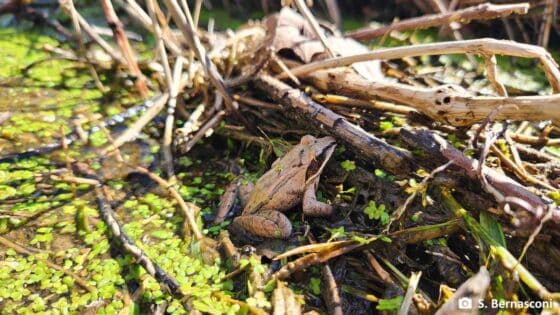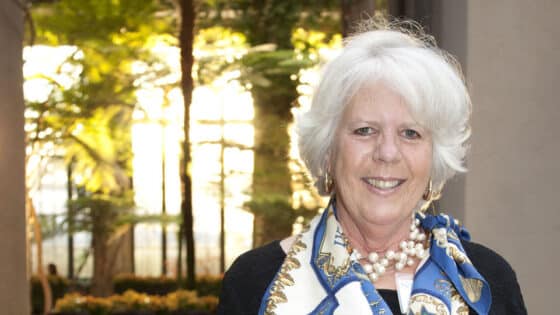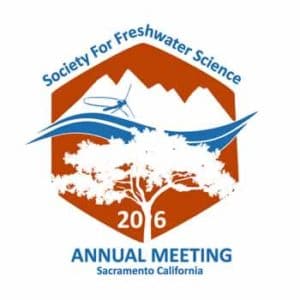 Water scarcity is no stranger to many parts of the world, including the western United States. Supply and demand are at increasing odds. To address this timely issue, the Society for Freshwater Science chose “Running on Empty” as the theme for its annual meeting this year, May 21-26.
Water scarcity is no stranger to many parts of the world, including the western United States. Supply and demand are at increasing odds. To address this timely issue, the Society for Freshwater Science chose “Running on Empty” as the theme for its annual meeting this year, May 21-26.
Appropriately held in California, the southern part of which is facing its worst drought on record, the 2016 conference focused on the consequences of depleting freshwater resources and potential solutions.
Stroud Water Research Center scientists and educators attended the conference, presented research findings, and introduced participants to the Leaf Pack Network.
Training Sacramentans to Monitor Their Watershed
Director Bern Sweeney, Ph.D., and Assistant Education Director and Leaf Pack Network Administrator Tara Muenz led the Leaf Pack Network workshop in Fair Oaks, California, at a beautiful spot along the American River at the Sacramento Waldorf School.
The American River, which runs 119 miles from the Sierra Nevada Mountain range to its confluence with the Sacramento River in the San Joaquin Valley, is a major source of fresh water to the Sacramento area.
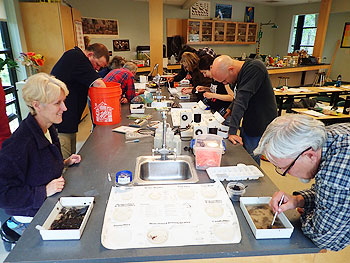
Sacramento Leaf Pack Network workshop participants received hands-on experience in making leaf packs, deploying them in a small tributary of the American River, identifying live macroinvertebrates, and putting them into a biotic index to rate the stream’s health. Photo: Tara Muenz
Participants including citizens, teachers, and naturalists, learned about the Leaf Pack Network, and received hands-on experience in making leaf packs, deploying them in a small tributary of the American River, identifying live macroinvertebrates, and putting them into a biotic index to rate the stream’s health. John Petering, a teacher at the school, gave a tour of the campus and made its teaching facilities available for the workshop.
Sweeney, along with Matthew McTammany, Ph.D., of Bucknell University, served as representative experts from the Society, provided assistance with macroinvertebrate identification and collection while Stephen McCord with the Sacramento River Watershed Program gave a special presentation on the local watershed, the threats it faces, and working to protect it.
“We are incredibly fortunate to have this opportunity each year teaching citizens across the country about their local watersheds through this partnership with the society,” said Muenz. “These trainings are important to give participants the tools, training, and partnership connections they need.”
Stroud Water Research Center gratefully acknowledges our local sponsors, who spread the word and provided the training site and lunch: The Sacramento River Watershed Program, The Sacramento Waldorf School, and Trader Joe’s!
Learn how you can assess the health of your local stream by visiting the Leaf Pack Network website.
High Temps Kill Mayflies, Signal Unhealthy Stream
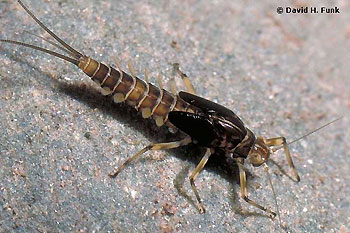 A Stroud Center study presented at the SFS annual meeting detailed how extreme increases in water temperature affect Baetid mayflies.
A Stroud Center study presented at the SFS annual meeting detailed how extreme increases in water temperature affect Baetid mayflies.
For streams and rivers to be a healthy place for fish and other aquatic species to live, cool stream temperatures with gradual seasonal changes are important.
However, warmer temperatures, as well as sudden changes in temperature, occur for a variety of reasons. Examples include thermal pollution in the form of industrial wastewater and the clearing of streamside forests that would otherwise provide cooling shade over streams.
In the oral presentation “Lethal and Sublethal Responses of Three Baetid Mayflies Exposed to Temperature Extremes” entomologist John Jackson, Ph.D., discussed a study of how extreme increases in temperature affected mayflies, which are sensitive to degrading stream conditions and thus good indicators of water quality and stream health. With increasing temperatures, mayfly development time and size declined. The death toll approached 100 percent as temperatures reached 28-34°C.
Former Students Honor Freshwater Science Professor
To honor the work of Vincent Resh, Ph.D., upon his retirement from the University of California, Berkeley, some of his past students presented on his work during a special session. John Jackson, Ph.D., head of the Stroud Center’s entomology group, was among them.
Jackson highlighted how his former professor, throughout his career, emphasized the importance of identifying species in ecological and pollution studies by showing that closely related species can function quite differently. This understanding led to studies on sex pheromones, adult and larval dispersal, and temporal population genetic structuring, which found physiological mechanisms for species separation, measured dispersal capacity, and confirmed the presence of gene flow and cryptic species.
Urban and Ag Areas of Bhutan Face Greater Threats to Clean Water
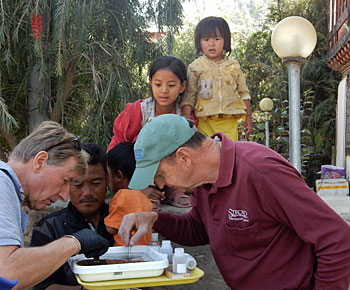
A team from the Stroud Center traveled to Bhutan last November to study water quality in stream and river reaches. Photo: Mandy Cabot
Stroud Center Director Bern Sweeney, Ph.D., presented on the availability of clean water in the Himalayan country of Bhutan. The country’s mountainous region makes tapping groundwater difficult, and there’s limited infrastructure for treating wastewater. Therefore, because Bhutan’s rivers and streams are such important sources of drinking water, a team of Stroud Center scientists traveled to Bhutan last November to study water quality in stream and river reaches upstream, within, and downstream of urban areas in the Paro, Thimphu, and Puna Tsang watersheds.
The team discovered that physical, chemical, and biological measurements indicated poorer water quality within and downstream of urban centers (although total coliform levels were often elevated upstream, presumably due to livestock).
You can read more about this study and how the Stroud Center provided methods, equipment, and training to Bhutanese citizens to test and monitor water quality in our 2015 annual report.

